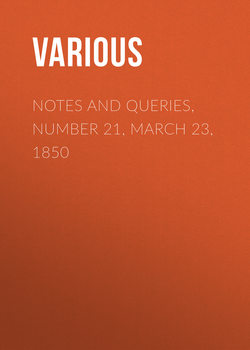Читать книгу Notes and Queries, Number 21, March 23, 1850 - Various - Страница 9
QUERIES
ОглавлениеA TREATISE ON THE LORD'S SUPPER, BY ROBERT CROWLEY
I have before me a somewhat scarce volume of Theological Tracts (small 8vo.), ranging between the years 1533 and 1614. With the exception of one relating to the Sacraments, by John Prime (Lond. 1582), the most curious treatise is that entitled "The Supper of the Lorde, after the true meanyng of the sixte of John, &c.... wherunto is added, an Epystle to the reader, And incidentally in the exposition of the Supper is confuted the letter of master More against John Fryth." To a motto taken from 1 Cor. xi. is subjoined the following date, "Anno M.CCCCC.XXXIII., v. daye of Apryll," together with a printer's device (two hands pointing towards each other). This Tract was promptly answered by Sir Thomas More (A.D. 1533, "after he had geuen ouer the offyce of Lorde Chauncellour of Englande"), and is described by him as "the poysoned booke whych a nameles heretike hath named the Supper of the Lorde" (Works, pp. 1035, seqq., ed. Rastell). From the following passage of the reply, we learn that this offensive publication, like so many others of the same class, has been printed abroad:—
"And in thys wyse is ther sent ouer to be prynted the booke that Frythe made last against the blessed sacrament answering to my letter, wherewyth I confuted the pestilent treatice that he hadde made agaynst it before. And the brethen looked for it nowe at thys Bartlemewe tide last passed, and yet looke euery day, except it be come all redy, and secretly runne among them. But in the meane whyle, ther is come ouer a nother booke againste the blessed sacrament, a booke of that sorte, that Frythe's booke the brethren maye nowe forbeare. For more blasphemous and more bedelem rype then thys booke is were that booke harde to be, whyche is yet madde enough, as men say that haue seen it" (p. 1036. G.).
More was evidently at a loss to discover the author of this work; for, after conjecturing that it might have come from William Tyndal, or George Jaye (alias Joy), or "som yong unlearned fole," he determines "for lacke of hys other name to cal the writer mayster Masker," a sobriquet which is preserved throughout his confutation. At the same time, it is clear, from the language of the treatise, that its author, though anonymous, believed himself well known to his opponent:
